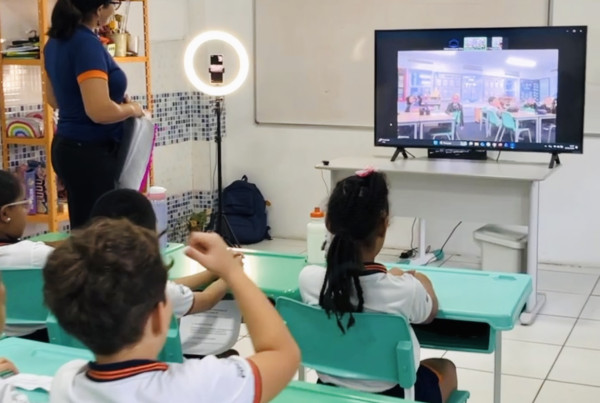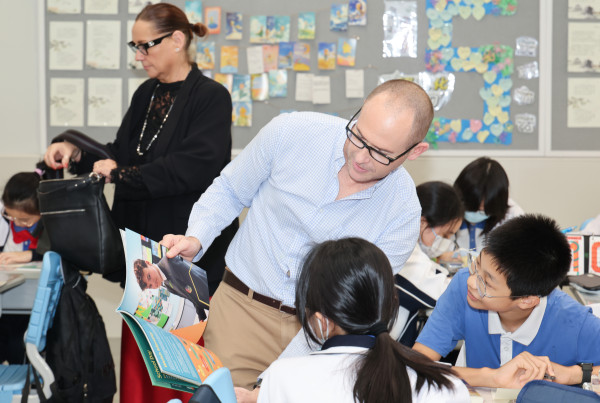The following article comes from Holly Barradell, Assistant Principal in the UK.
For those of us in education working on curriculum design and its implementation, the new curriculum-focused inspection from Ofsted is a professionally engaging dream. Prior to this new focus the words “We have had the call” filled most educators with absolute dread.
I write this blog from my own personal experience. I’m an Assistant Principal in an all-ability Academy in Kent, within my role I focus on Curriculum, Progress and Learning in the subject areas of English, Drama, Music and PE. I am also a Governor in a Community Primary School in Surrey. I feel very lucky to have an insight into both Primary and Secondary education and to gain knowledge of how an academy and a local authority school run. During the 2021/22 academic year I experienced both a Section 8 and Section 5 inspection. As a senior leader I supported my colleagues through a section 8 inspection and as a governor I supported the school through a section 5 inspection. I have had a unique and rewarding experience of the inspection framework across settings from different leadership and management perspectives.
Where I work, we are currently graded outstanding from our last section 5 inspection (2016) and therefore we had a section 8 inspection and did not receive a graded judgement from the visit. A deep dive of English took place and I’d had leadership oversight of the subject since the start of the academic year. I had every faith that the department would do well. With the new framework having a curriculum focus the senior leaders work must all been done long before any phone call. The inspection focuses on the subject leads, their teaching teams and what students tell them.
The importance of the Ofsted Self-Evaluation Form (SEF) in the new framework
Conversations during an inspection are no longer about challenging senior leaders on what happens and why – that happens before and during the initial phone call, inspectors have read the website, looked at information surrounding the school and during the long initial conversation with the Headteacher the SEF is a crucial document which must be up to date, and realistic. Having an over ambitious unrealistic SEF sets you up for a fall, honesty and accuracy in understanding the school is a reflection of the leadership and management of the setting.
Inspectors do the legwork before arriving so they can get on the ground and see what is happening in classrooms being driven by middle leaders. The phrase the “engine room” has never been so pertinent.
Read “Middle leaders are the engine room of the school, sitting at the heart of school improvement.”
How to evidence curriculum intent during an inspection
Inspectors will triangulate Heads of Subject, to teachers, to students to check the narrative runs through and remains the same. They will expect to see evidence of what they are told from middle leaders, for example, “We have a curriculum that is literacy rich. We start all our lessons with 10 minutes of silent reading.” The inspector is picking up from the Head of English that literacy is a priority (hopefully this is reflected in the SEF too!) and that if they visit the start of any English lesson, they will see silent reading. They expect to see this, they may ask teachers about this, they may then ask students about this too. This is where the inspection becomes a dream. All your hard work as a Head of Subject starts to pay off, you’ve created a curriculum intent, you’ve worked with your team to implement it and you proudly look at the impact this is having on young people – hopefully!
Your intention links to the SEF and under Quality of Education your subject intention knits into the wider whole school picture and focus for improvement. You implement (deliver) your curriculum in a way that works for the young people in front of you, you have consideration for the demographic and needs of your community, you use data and tools around you to analyse the impact your work is having and the consider the destinations of your students.

There is nowhere to hide with the new approach to inspection. You must walk the walk and take your team with you. The mapping of a curriculum needs to consider all the key stages and the full ‘journey’ a young person might go on, don’t break down the journey and see it as 3 or 5 years only, a young person might stop at the end of KS3 or KS4, but you need a curriculum that doesn’t restrict young people to a journey bound by key stages.
Preparing for a ‘Deep Dive’
Inspectors will have a hypothesis. They will pursue this and the conversations and actions of the inspection either proves or disproves the hypothesis. When the Headteacher initially talks with the inspectors they have control to steer which subjects will be deep dived. When your Headteacher brings you all together to say that Ofsted are coming they will tell you the subjects that are being deep dived this isn’t a time for those subjects not selected to relax and feel ‘off the hook’ however.
You need to be prepared that a line of enquiry may come out of a deep dive in one subject that sends inspectors off to other subjects to either prove or disprove something they see. Any Head of Subject that is passionate about what they do should want to have a deep dive – why wouldn’t you want a professional conversation discussing what you have done, why and how it is going?
The rhetoric of “that was good, I enjoyed it” is becoming more and more commonplace thankfully. Our profession deserves to be praised and have inspections that highlight good practice and the hard work of colleagues. Senior leaders not providing the space for middle leaders to prepare curriculums in detail, middle leaders that aren’t leading their teams to be effective or teachers not implementing successfully will be caught out and rightly so – everyone deserves education, at the highest of levels.
Share this
Suggested further reading and support resources:
Huh Curriculum conversations between subject and senior leaders by Mary Myatt and John Tomsett.
https://www.johncattbookshop.com/huh-curriculum-conversations-between-subject-and-senior-leaders
As a senior leader this book supports you with the line management of subjects you may know very little about, yet you need to hold the curriculum leaders to account. This book enabled me to support school improvement across the subjects I managed.
There is also Primary Huh: Curriculum conversations with subject leaders in primary schools which helps with conversations between primary teachers, key stage co-ordinators and senior leaders with curriculum development work. It is also useful to read as a secondary specialist when considering the curriculum journey for young people after KS2/before KS3.
Open Drama UK’s resource for a Drama subject deep dive.
Luke Haisell, Co-champion of Kent for Open Drama UK created a resource to support Heads of Drama in preparing for a subject deep dive. Luke shared his thoughts on the key areas to think about to ensure you can celebrate your department’s successes during an inspection visit. https://opendramauk.org/portfolio/ofsteddeepdive/





